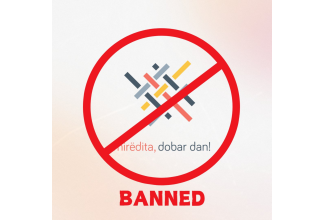New Media Report on Freedom of Expression in Kosovo
On the International World Press Day, 3 May, Civil Rights Defenders’ partners Kosovo 2.0, COHU! and Press Council of Kosovo released a new comprehensive report on the media scene in Kosovo. The report, supported by Civil Rights Defenders, is the outcome of a combination of research methods, including a survey of 175 participating journalists, two focus groups, desk research and 16 individual in-depth interviews.
The report reveals a number of deviations from the European standards of media, information and the freedom of expression in Kosovo and it is the first comprehensive analysis of the media scene in the country. It includes a presentation of the main challenges to the implementation of the 27 principles related to freedom of expression and media depicted in the Council of Europe’s Resolution 1636(2008).
Furthermore, the report provides an overview of the issues identified in relation to each indicator and it emphasises main concerns, challenges and problems that have been put forward by journalists and media experts. The report as such aims to provide a preliminary assessment and serve as a basis upon which periodic assessments can be undertaken.
The report also shows that the legal framework has been consolidated over the years in order to provide the essential rights to freedom of expression, media and information. However, the level of enforceability of the overall legislation remains problematic. Enhanced transparency is required, especially in terms of requests to access information, where privacy and state secrecy are sometimes unjustifiably used as grounds for blocking the access.
Additional concerns that have been identified include the influence that is exerted through different means, particularly in terms of intervention from individuals within politics and businesses. While journalists generally perceive a level of independence from media owners, interference continues to be present in daily editorial work, which compromises impartial journalism and leads to self-censorship. Moreover, the government and the courts are not open to the media in a fair and equal way, which infringes on the rights of media outlets to inform their respective audiences.
Media ownership continues to remain an area subjected to vague disclosure of information. This is particularly so in regards to online media. Greater efforts are required in order to ensure that journalists are provided with the protection they need — both in regards to the judiciary and within their media outlets. On the one hand, cases of threats towards journalists are not always treated with priority by relevant institutions, and on the other hand, the lack of adequate implementation of working contracts fails to offer journalists social protection, which compromises their impartiality and independence.
In regards to the regulative frameworks, the Independent Media Commission (IMC) and the self-regulatory mechanism of the PCK are generally perceived as functioning effectively. However, the continuous politicisation of the IMC’s board infringes upon its independence and capacities, and the PCK should engage in greater efforts to contribute to the ethical regulation of online media.
Ultimately, the Kosovo Assembly should embrace a more proactive role and approach when it comes to ensuring a collation of media-related legislation as well as a proper implementation, drafting systematic assessments reports, and ensuring a free media environment.
Read the full report here.


